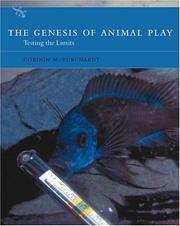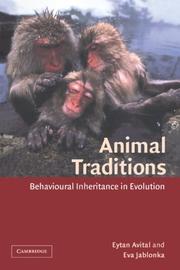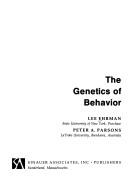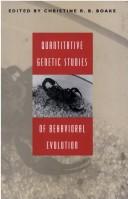| Listing 1 - 10 of 47 | << page >> |
Sort by
|
Book
ISBN: 1628943084 9781628943085 9781628943061 9781628943078 Year: 2017 Publisher: New York : Algora Publishing,
Abstract | Keywords | Export | Availability | Bookmark
 Loading...
Loading...Choose an application
- Reference Manager
- EndNote
- RefWorks (Direct export to RefWorks)
Human evolution --- Behavior evolution. --- Behavioral evolution --- Evolutionary psychology --- Evolution (Biology) --- Physical anthropology --- Human beings --- Social aspects. --- Origin

ISBN: 3534113349 9783534113347 Year: 1990 Publisher: Darmstadt : Wissenschaftliche Buchgesellschaft,
Abstract | Keywords | Export | Availability | Bookmark
 Loading...
Loading...Choose an application
- Reference Manager
- EndNote
- RefWorks (Direct export to RefWorks)
Behavior evolution --- Evolution --- Philosophy --- Creation --- Emergence (Philosophy) --- Teleology --- Behavioral evolution --- Evolutionary psychology --- Behavior evolution. --- Evolution. --- Nature --- Effect of human beings on. --- Anthropogenic effects on nature --- Ecological footprint --- Effect of human beings on --- Human beings --- Anthropogenic soils --- Human ecology

ISBN: 0262025434 9780262269551 0262269554 9780262025430 1282100777 9786612100772 142941300X Year: 2005 Publisher: Cambridge, Mass. : MIT Press,
Abstract | Keywords | Export | Availability | Bookmark
 Loading...
Loading...Choose an application
- Reference Manager
- EndNote
- RefWorks (Direct export to RefWorks)
In The Genesis of Animal Play, Gordon Burghardt examines the origins and evolution of play in humans and animals. He asks what play might mean in our understanding of evolution, the brain, behavioral organization, and psychology. Is play essential to development? Is it the driving force behind human and animal behavior? What is the proper place for the study of play in the cognitive, behavioral, and biological sciences?The engaging nature of play--who does not enjoy watching a kitten attack a ball of yarn?--has made it difficult to study. Some scholars have called play undefinable, nonexistent, or a mystery outside the realm of scientific analysis. Using the comparative perspectives of ethology and psychology, The Genesis of Animal Play goes further than other studies in reviewing the evidence of play throughout the animal kingdom, from human babies to animals not usually considered playful. Burghardt finds that although playfulness may have been essential to the origin of much that we consider distinctive in human (and mammalian) behavior, it only develops through a specific set of interactions among developmental, evolutionary, ecological, and physiological processes. Furthermore, play is not always beneficial or adaptive.Part I offers a detailed discussion of play in placental mammals (including children) and develops an integrative framework called surplus resource theory. The most fascinating and most controversial sections of the book, perhaps, are in the seven chapters in part II in which Burghardt presents evidence of playfulness in such unexpected groups of animals as kangaroos, birds, lizards, and "Fish That Leap, Juggle, and Tease." Burghardt concludes by considering the implications of the diversity of play for future research, and suggests that understanding the origin and development of play can shape our view of society and its accomplishments through history.
Play behavior in animals. --- Play. --- Behavior evolution. --- Behavioral evolution --- Evolutionary psychology --- Recreations --- Recreation --- Amusements --- Games --- Play in animals --- Animal behavior --- Cognition and cognitive psychology --- COGNITIVE SCIENCES/General --- BIOMEDICAL SCIENCES/Evolution

ISBN: 1107118603 9786610420964 0511542259 0521022118 0511175566 0511325363 1280420960 0511156006 051104903X 0511019734 9780511019739 9780511049033 0511033796 9780511033797 9780511156007 9780511175565 9780511542251 9780521662734 0521662737 9781280420962 0521662737 9781107118607 6610420963 9780521022118 9780511325366 Year: 2000 Publisher: Cambridge, UK ; New York : Cambridge University Press,
Abstract | Keywords | Export | Availability | Bookmark
 Loading...
Loading...Choose an application
- Reference Manager
- EndNote
- RefWorks (Direct export to RefWorks)
Animal Traditions maintains that the assumption that the selection of genes supplies both a sufficient explanation of the evolution and a true description of its course is, despite its almost universal acclaim, wrong. Eytan Avital and Eva Jablonka contend that evolutionary explanations must take into account the well-established fact that in mammals and birds, the transfer of learnt information is both ubiquitous and indispensable. The introduction of the behavioural inheritance system into the Darwinian explanatory scheme enables the authors to offer new interpretations for common behaviours such as maternal behaviours, behavioural conflicts within families, adoption and helping. This approach offers a richer view of heredity and evolution, integrates developmental and evolutionary processes, suggests new lines for research, and provides a constructive alternative to both the selfish gene and meme views of the world. It will make stimulating reading for all those interested in evolutionary biology, sociobiology, behavioural ecology and psychology.
Animal behavior. --- Behavior evolution. --- Behavior genetics. --- Behavior genetic analysis --- Behavioral genetics --- Human behavior genetics --- Psychogenetics --- Genetics --- Psychology --- Behavioral evolution --- Evolutionary psychology --- Animals --- Animals, Habits and behavior of --- Behavior, Animal --- Ethology --- Animal psychology --- Zoology --- Ethologists --- Psychology, Comparative --- Behavior
Book
ISBN: 0878930175 Year: 1993 Publisher: Sunderland, MA : Sinauer,
Abstract | Keywords | Export | Availability | Bookmark
 Loading...
Loading...Choose an application
- Reference Manager
- EndNote
- RefWorks (Direct export to RefWorks)
591.5 --- Animal behavior --- Behavior evolution --- -Animals --- Animals, Habits and behavior of --- Behavior, Animal --- Ethology --- Animal psychology --- Zoology --- Ethologists --- Psychology, Comparative --- Behavioral evolution --- Evolutionary psychology --- Animal habits. Animal behaviour. Ecology. Ethology. Animal and environment. Bionomy --- Evolution --- Behavior --- Evolution. --- -Animal habits. Animal behaviour. Ecology. Ethology. Animal and environment. Bionomy --- 591.5 Animal habits. Animal behaviour. Ecology. Ethology. Animal and environment. Bionomy --- -Behavioral evolution --- Animals --- Behavior, Animal.
Book
ISBN: 080538507X Year: 1985 Publisher: Menlo Park Amsterdam San Juan Benjamin/Cummings
Abstract | Keywords | Export | Availability | Bookmark
 Loading...
Loading...Choose an application
- Reference Manager
- EndNote
- RefWorks (Direct export to RefWorks)
Evolution. Phylogeny --- Behavior evolution --- Behavioral evolution --- Comportement [Evolution du ] --- Comportement social des animaux --- Cultural evolution --- Cultural transformation --- Culture [Evolution of ] --- Evolutie [Sociale ] --- Evolutie van het gedrag --- Evolution du comportement --- Evolution sociale --- Gedrag [Evolutie van het ] --- Sociaal gedrag bij dieren --- Social behavior in animals --- Social evolution --- Sociale evolutie --- Social evolution in animals.
Book
ISBN: 0045730172 9780045730179 Year: 1984 Publisher: Boston: Allen and Unwin,
Abstract | Keywords | Export | Availability | Bookmark
 Loading...
Loading...Choose an application
- Reference Manager
- EndNote
- RefWorks (Direct export to RefWorks)
Philosophical anthropology --- Sociobiology --- Human behavior --- Social evolution --- Behavior evolution --- Biologism --- Human biology --- Human evolution --- Psychology, Comparative --- Cultural evolution --- Cultural transformation --- Culture, Evolution of --- Culture --- Evolution --- Social change --- Action, Human --- Behavior, Human --- Ethology --- Human action --- Human beings --- Physical anthropology --- Psychology --- Social sciences --- Behavioral evolution --- Evolutionary psychology --- Social aspects --- Behavior --- Behavior evolution. --- Human behavior. --- Social evolution. --- Sociobiology.

ISBN: 0878931732 9780878931736 Year: 1976 Publisher: Sunderland (Mass.): Sinauer associates,
Abstract | Keywords | Export | Availability | Bookmark
 Loading...
Loading...Choose an application
- Reference Manager
- EndNote
- RefWorks (Direct export to RefWorks)
Animal genetics. Animal evolution --- Animal ethology and ecology. Sociobiology --- Behavior genetics --- Behavior evolution --- Genetique du comportement --- Evolution du comportement --- Genetics, Behavioral. --- Behavior genetic analysis --- Behavioral genetics --- Psychogenetics --- Genetics --- Psychology --- Behavioral evolution --- Evolutionary psychology --- Behavioral Genetics --- Behavior --- Sociobiology --- Behavior evolution. --- Behavior genetics. --- Genetics, Behavioral --- Human behavior genetics

ISBN: 0226062163 Year: 1994 Publisher: Chicago University of Chicago Press
Abstract | Keywords | Export | Availability | Bookmark
 Loading...
Loading...Choose an application
- Reference Manager
- EndNote
- RefWorks (Direct export to RefWorks)
Behavior evolution --- Behavior genetic analysis --- Behavior genetics --- Behavioral evolution --- Behavioral genetics --- Comportement [Evolution du ] --- Comportement [Génétique du ] --- Evolutie van het gedrag --- Evolution du comportement --- Gedrag [Evolutie van het ] --- Gedrag [Genetica van het ] --- Genetica van het gedrag --- Genetics [Behavioral ] --- Génétique comportementale --- Génétique du comportement --- Génétique quantitative --- Kwantitatieve genetica --- Psychogenetics --- Quantitative genetics --- Quantitative inheritance --- Behavior evolution. --- Behavior genetics. --- Quantitative genetics.

ISBN: 0691034931 9780691034935 0691167982 140084360X 9781400843602 9780691167985 Year: 1995 Publisher: Princeton, NJ : Princeton University Press,
Abstract | Keywords | Export | Availability | Bookmark
 Loading...
Loading...Choose an application
- Reference Manager
- EndNote
- RefWorks (Direct export to RefWorks)
The Neanderthals populated western Europe from nearly 250,000 to 30,000 years ago when they disappeared from the archaeological record. In turn, populations of anatomically modern humans, Homo sapiens, came to dominate the area. Seeking to understand the nature of this replacement, which has become a hotly debated issue, Paul Mellars brings together an unprecedented amount of information on the behavior of Neanderthals. His comprehensive overview ranges from the evidence of tool manufacture and related patterns of lithic technology, through the issues of subsistence and settlement patterns, to the more controversial evidence for social organization, cognition, and intelligence. Mellars argues that previous attempts to characterize Neanderthal behavior as either "modern" or "ape-like" are both overstatements. We can better comprehend the replacement of Neanderthals, he maintains, by concentrating on the social and demographic structure of Neanderthal populations and on their specific adaptations to the harsh ecological conditions of the last glaciation. Mellars's approach to these issues is grounded firmly in his archaeological evidence. He illustrates the implications of these findings by drawing from the methods of comparative socioecology, primate studies, and Pleistocene paleoecology. The book provides a detailed review of the climatic and environmental background to Neanderthal occupation in Europe, and of the currently topical issues of the behavioral and biological transition from Neanderthal to fully "modern" populations.
Behavior evolution --- Human evolution --- Neanderthals --- Paleolithic period --- Philosophy. --- Europe --- Antiquities. --- Homo mousteriensis --- Homo neanderthalensis --- Homo primogenicus --- Homo sapiens neanderthalensis --- Neandertalers --- Neandertals --- Neanderthal race --- Neanderthalers --- Behavioral evolution --- Fossil hominids --- Evolutionary psychology --- Evolution (Biology) --- Physical anthropology --- Human beings --- Origin --- Philosophy --- Antiquities --- Neanderthals - Europe. --- Human evolution - Europe - Philosophy. --- Behavior evolution - Europe.
| Listing 1 - 10 of 47 | << page >> |
Sort by
|

 Search
Search Feedback
Feedback About UniCat
About UniCat  Help
Help News
News